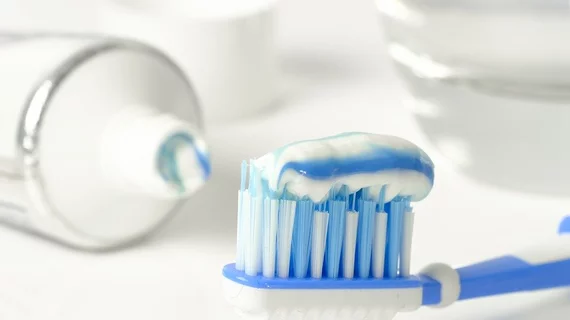Brushing teeth three or more times a day could dramatically lower a person’s risk for CVDs like heart failure and atrial fibrillation, according to preliminary research out of Ewha Womans University in Seoul, South Korea.
Senior author Tae-Kin Song and colleagues enrolled 161,286 participants from the Korean National Health Insurance System for their study, which examined the effect of teeth brushing on cardiovascular health. Brushing three times a day might sound like overkill—the American Dental Association recommends brushing just twice a day and flossing once for optimal oral health—but Song et al. said poor oral hygiene can allow bacteria to enter the bloodstream, resulting in inflammation that increases a person’s risk for AFib or heart failure.
All participants in the team’s study were aged 40 to 79 and underwent a routine medical exam between 2003 and 2004. Researchers recorded their height, weight, oral health, lab test results and illnesses and asked them about their lifestyle and oral hygiene behaviors.
After more than a decade of follow-up, Song and colleagues reported that 4,911 patients—3% of the study population—had developed atrial fibrillation. An additional 7,791 patients, translating to 4.9% of the total cohort, had developed heart failure.
The authors said that brushing teeth three or more times a day was linked to a 10% lower risk of AFib and a 12% lower risk of heart failure over ten and a half years. Their findings persisted after adjustment for age, sex, socioeconomic status, exercise, BMI and CV comorbidities like hypertension.
Song and colleagues' study didn’t investigate the mechanisms behind these links, but, according to a release from the European Society of Cardiology, the team thinks their results might have something to do with distribution of bacteria. Since brushing one’s teeth frequently minimizes bacteria in the subgingival biofilm, it prevents bacteria from entering the bloodstream and causing inflammation.
Song said in the release that he and his colleagues’ study is limited in its generalizability since it was restricted to one country and was observational in nature, but noted the large study group adds some weight to the project.
An accompanying editorial cautioned that the team’s findings should be taken with a grain of salt, warning, “It is certainly too early to recommend tooth brushing for the prevention of atrial fibrillation and congestive heart failure.”

